- Integrate the neuroscience behind the therapeutic powers of play therapy
- Better articulate to parents why play therapy works
- How children use toys to understand themselves
-
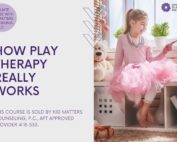 "I could watch Lisa talk about play therapy all day. This workshop gives you really helpful, crystallized ideas and nuggets about the play therapy process and how it allows children to heal. Definitely worth a watch when you're maybe feeling stuck with a specific client, or running out of metaphors to communicate the efficacy of play therapy with colleagues or parents." -Malia Segal Lisa unlocks the therapeutic powers of play in this foundational neuroscience-rich training .... In a profession that is fighting for recognition and to be taken seriously, not fully understanding exactly how play therapy transformation takes place is a void. Without really understanding how attuned play works to bring about lasting change, therapists are left feeling uncertain and missing the language to effectively talk to parents, teachers and other influential people in children’s lives. The therapist's ability to influence other professions to see the value in play therapy is also impacted. This presentation is designed to fill in gaps in the play therapist’s understanding by addressing the answer to this very important question- how exactly does play therapy work? Through presentation and discussion, participants will be taken into the minds and biology of children for an inside look at what goes on that leads to their transformation and healing. With the help of neuroscience, brain development, and interpersonal neurobiology, the “how” will be answered allowing participants to truly understand the process and what exactly is going on in the playroom. This dynamic, eye-opening and thought provoking presentation will empower therapists to begin to move beyond their current framework. This course is for you if you want to ...
"I could watch Lisa talk about play therapy all day. This workshop gives you really helpful, crystallized ideas and nuggets about the play therapy process and how it allows children to heal. Definitely worth a watch when you're maybe feeling stuck with a specific client, or running out of metaphors to communicate the efficacy of play therapy with colleagues or parents." -Malia Segal Lisa unlocks the therapeutic powers of play in this foundational neuroscience-rich training .... In a profession that is fighting for recognition and to be taken seriously, not fully understanding exactly how play therapy transformation takes place is a void. Without really understanding how attuned play works to bring about lasting change, therapists are left feeling uncertain and missing the language to effectively talk to parents, teachers and other influential people in children’s lives. The therapist's ability to influence other professions to see the value in play therapy is also impacted. This presentation is designed to fill in gaps in the play therapist’s understanding by addressing the answer to this very important question- how exactly does play therapy work? Through presentation and discussion, participants will be taken into the minds and biology of children for an inside look at what goes on that leads to their transformation and healing. With the help of neuroscience, brain development, and interpersonal neurobiology, the “how” will be answered allowing participants to truly understand the process and what exactly is going on in the playroom. This dynamic, eye-opening and thought provoking presentation will empower therapists to begin to move beyond their current framework. This course is for you if you want to ... -
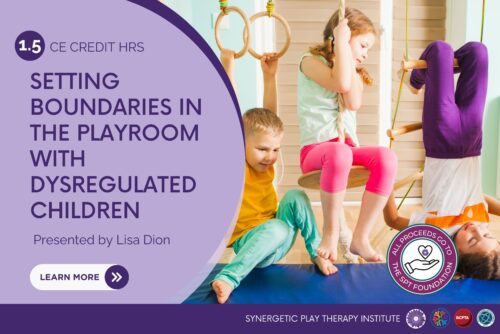 This course supports play therapists as they learn about setting boundaries from a neurobiological perspective, keeping the child’s brain and nervous system activation in mind! Drawing from Interpersonal Neurobiology and Synergetic Play Therapy, participants will learn how to set boundaries without shaming the child or stopping the child’s play, allowing for deeper integration and connection. Working with emotional flooding (the child’s and the therapist’s) will also be explored. Please scroll down for course details.
This course supports play therapists as they learn about setting boundaries from a neurobiological perspective, keeping the child’s brain and nervous system activation in mind! Drawing from Interpersonal Neurobiology and Synergetic Play Therapy, participants will learn how to set boundaries without shaming the child or stopping the child’s play, allowing for deeper integration and connection. Working with emotional flooding (the child’s and the therapist’s) will also be explored. Please scroll down for course details. -
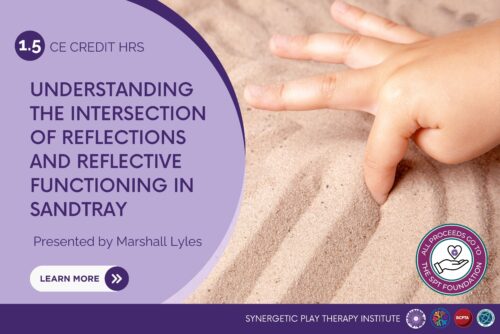 Sandtray therapy prominently features the art of reflecting. In fact, it may be the therapy skill most associated with the craft. However, we can become so accustomed to the language of reflecting that we can lose contact with its intent. In this course, you will explore the skill of reflecting through the lens of the attachment theory concept of reflective functioning. Marshall Lyles will walk you through examples honoring this intersection through use of the sand tray. Scroll down for all of the course details!
Sandtray therapy prominently features the art of reflecting. In fact, it may be the therapy skill most associated with the craft. However, we can become so accustomed to the language of reflecting that we can lose contact with its intent. In this course, you will explore the skill of reflecting through the lens of the attachment theory concept of reflective functioning. Marshall Lyles will walk you through examples honoring this intersection through use of the sand tray. Scroll down for all of the course details! -
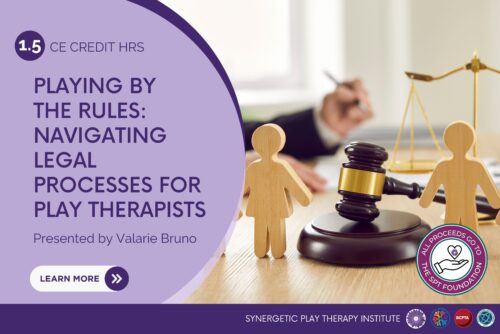 When play therapy intersects with the legal system, play therapists often find themselves in unfamiliar territory. Navigating legal processes can be daunting without proper guidance, leaving therapists feeling uncertain and ill-prepared to advocate for their clients effectively. Learn what you need to know to steer through the legal system with ease and confidence. You’ll leave this presentation empowered to effectively advocate for your clients, ensuring their voices are heard and their needs are met. Scroll down for all of the course details!
When play therapy intersects with the legal system, play therapists often find themselves in unfamiliar territory. Navigating legal processes can be daunting without proper guidance, leaving therapists feeling uncertain and ill-prepared to advocate for their clients effectively. Learn what you need to know to steer through the legal system with ease and confidence. You’ll leave this presentation empowered to effectively advocate for your clients, ensuring their voices are heard and their needs are met. Scroll down for all of the course details! -
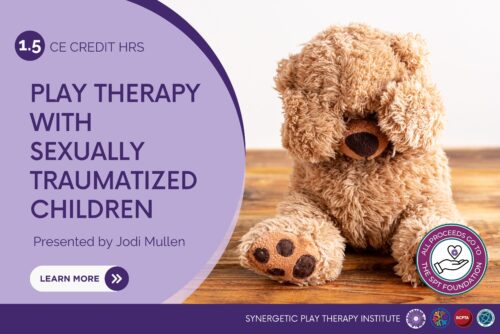 Children who have been sexually traumatized are often in need of our clinical services. Both directive and non-directive play therapy approaches provide these traumatized children with healing and the repair of losses associated with sexual trauma, such as innocence, trust, and appropriate boundaries. In this course you will develop your expertise and become a more effective advocate for your child clients with the knowledge and insight offered through this presentation. You will learn about sexual development in children, the psychological markers of sexual trauma, and the special issues these children present in play therapy, including: consulting with non-offending parents, dealing with the powerful impact of countertransference, and setting limits. Scroll down for all of the course details!
Children who have been sexually traumatized are often in need of our clinical services. Both directive and non-directive play therapy approaches provide these traumatized children with healing and the repair of losses associated with sexual trauma, such as innocence, trust, and appropriate boundaries. In this course you will develop your expertise and become a more effective advocate for your child clients with the knowledge and insight offered through this presentation. You will learn about sexual development in children, the psychological markers of sexual trauma, and the special issues these children present in play therapy, including: consulting with non-offending parents, dealing with the powerful impact of countertransference, and setting limits. Scroll down for all of the course details! -
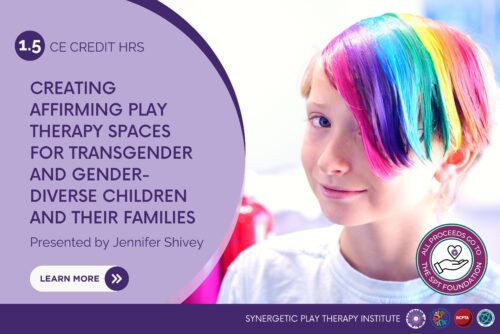 Transgender and gender-diverse children face unique challenges in navigating their identities and experiences. Their families face challenges, too, but can often be fearful of voicing them due to worries about how others may perceive them. Clinicians are often well meaning but can do unintended harm due to the blind spots they are not aware of when working with this population. Play therapy offers a dynamic and effective approach to support these children and their families in understanding and expressing themselves in a safe and affirming environment, given the appropriate knowledge offered by the clinician. This workshop aims to equip therapists with the knowledge, skills, and confidence necessary to provide effective and affirming play therapy for transgender and gender-diverse children - and their families! Scroll down for all of the course details!
Transgender and gender-diverse children face unique challenges in navigating their identities and experiences. Their families face challenges, too, but can often be fearful of voicing them due to worries about how others may perceive them. Clinicians are often well meaning but can do unintended harm due to the blind spots they are not aware of when working with this population. Play therapy offers a dynamic and effective approach to support these children and their families in understanding and expressing themselves in a safe and affirming environment, given the appropriate knowledge offered by the clinician. This workshop aims to equip therapists with the knowledge, skills, and confidence necessary to provide effective and affirming play therapy for transgender and gender-diverse children - and their families! Scroll down for all of the course details! -
 "The Intro to SPT class is the best class I have ever taken. There is no better training for counselors! I have a deeper understanding of the process and how to help children in the playroom. It has given me a whole new perspective and changed my life both personally and professionally. Being authentic allows you to be free. There are just no words to describe it!" -Nancy Asher The Live - Introduction to Synergetic Play Therapy™ is a 18-hour course that takes you on a journey to explore the neuroscience behind what is happening in the play therapy process, how to repattern a child's nervous system, and what it means to become an external regulator in the playroom. You will also learn how to effectively work with caregivers and what it means to create a neuroception of safety allowing both the child and the caregiver to have a deeper integration. And if this wasn't enough, you will come to understand the magic of aggressive play, sand and art from the perspectives of nervous system regulation, attunement, attachment, mindfulness, and authenticity. You'll learn all this while also how to avoid burnout and compassion fatigue. Come discover what showing up in the playroom truly means and explore what is happening in the play therapy process, how change occurs, and ultimately what it takes to help children heal at profound levels. And the best part is, you get to be you on the journey! This payment link is for the 6 mandatory group consultations part of this course. Consultation is a mandatory part of the course to help you integrate what you learned …If you’d like, you can meet the Consultants here. Cost: $50.00 per session. 6 sessions. *For class details and objectives, see below.
"The Intro to SPT class is the best class I have ever taken. There is no better training for counselors! I have a deeper understanding of the process and how to help children in the playroom. It has given me a whole new perspective and changed my life both personally and professionally. Being authentic allows you to be free. There are just no words to describe it!" -Nancy Asher The Live - Introduction to Synergetic Play Therapy™ is a 18-hour course that takes you on a journey to explore the neuroscience behind what is happening in the play therapy process, how to repattern a child's nervous system, and what it means to become an external regulator in the playroom. You will also learn how to effectively work with caregivers and what it means to create a neuroception of safety allowing both the child and the caregiver to have a deeper integration. And if this wasn't enough, you will come to understand the magic of aggressive play, sand and art from the perspectives of nervous system regulation, attunement, attachment, mindfulness, and authenticity. You'll learn all this while also how to avoid burnout and compassion fatigue. Come discover what showing up in the playroom truly means and explore what is happening in the play therapy process, how change occurs, and ultimately what it takes to help children heal at profound levels. And the best part is, you get to be you on the journey! This payment link is for the 6 mandatory group consultations part of this course. Consultation is a mandatory part of the course to help you integrate what you learned …If you’d like, you can meet the Consultants here. Cost: $50.00 per session. 6 sessions. *For class details and objectives, see below. -
 *This is NOT a course. Earn non-contact continuing education credit by completing a quiz based on the book. Aggression in Play Therapy: A Neurobiological Approach to Integrating Intensity offers a way to work with aggressive play that allows children to learn how integrate the intensity they are experiencing from their thoughts, emotions, and sensations while simultaneously supporting regulation in the therapist's nervous system. These will help therapists understand the neurobiological processes that lead kids to dys-regulation, and help them facilitate emotional healing in their clients. Topics Covered Include:
*This is NOT a course. Earn non-contact continuing education credit by completing a quiz based on the book. Aggression in Play Therapy: A Neurobiological Approach to Integrating Intensity offers a way to work with aggressive play that allows children to learn how integrate the intensity they are experiencing from their thoughts, emotions, and sensations while simultaneously supporting regulation in the therapist's nervous system. These will help therapists understand the neurobiological processes that lead kids to dys-regulation, and help them facilitate emotional healing in their clients. Topics Covered Include:- What Regulation Really Means
- Making Aggressive Play Therapeutic
- Authentic Expression
- Setting Boundaries
- Hyper-Aroused Play
- Observing Play
- Hypo-Aroused Play
- Working with Parents
- Developing Yourself as the External Regulator
-
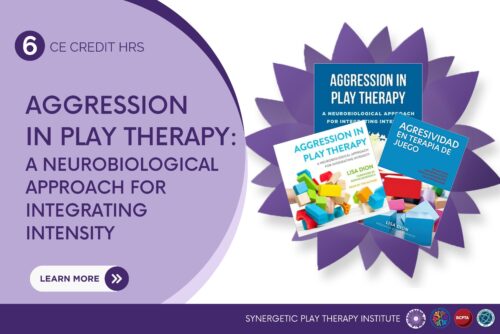 With an understanding of aggressive play based on brain function and neuroscience, this book provides therapists with a framework to work authentically with aggressive play, while making it an integrative and therapeutic experience for the child. Through the lens of principles from Synergetic Play Therapy®, therapists are taught how to integrate the intensity experienced by both the child and the therapist during aggressive play in a way that leads towards greater healing and integration. The book explains the neurological processes that lead kids to dysregulation and provides therapists with tools to help their clients facilitate deep emotional healing, without causing their own nervous system to shut down. Chapter Topics Include:
With an understanding of aggressive play based on brain function and neuroscience, this book provides therapists with a framework to work authentically with aggressive play, while making it an integrative and therapeutic experience for the child. Through the lens of principles from Synergetic Play Therapy®, therapists are taught how to integrate the intensity experienced by both the child and the therapist during aggressive play in a way that leads towards greater healing and integration. The book explains the neurological processes that lead kids to dysregulation and provides therapists with tools to help their clients facilitate deep emotional healing, without causing their own nervous system to shut down. Chapter Topics Include:- Aggression in the Playroom and Making Aggressive Play Therapeutic
- Understanding the Nervous System
- What Regulation Really Means
- Developing Yourself as the External Regulator
- The Set-Up in Play Therapy
- Authentic Expression
- Setting Boundaries
- Working with Emotional Flooding
- Hyper-Aroused Play
- Observing Play
- Hypo-Aroused Play
- Working with Parents
-
 Aggression and death are common parts of the play therapy process, yet many therapists don’t have a clear understanding of what to do and how to facilitate intensity. This can lead to inadvertently promoting aggression and low brain disorganization. It can also lead to the therapist feeling beat up, exhausted, and hyper-aroused, ultimately impacting their ability to stay attuned, remain present, and find inspiration in this field. Enter Synergetic Play Therapy! Through an SPT lens, and a heavy dose of neuroscience, this 2-hour course helps therapists learn how to use play in a way that supports regulation – their own and their client’s! See course details below.
Aggression and death are common parts of the play therapy process, yet many therapists don’t have a clear understanding of what to do and how to facilitate intensity. This can lead to inadvertently promoting aggression and low brain disorganization. It can also lead to the therapist feeling beat up, exhausted, and hyper-aroused, ultimately impacting their ability to stay attuned, remain present, and find inspiration in this field. Enter Synergetic Play Therapy! Through an SPT lens, and a heavy dose of neuroscience, this 2-hour course helps therapists learn how to use play in a way that supports regulation – their own and their client’s! See course details below. -
 Helping children learn how to regulate is essential, but without first strengthening the child's interoceptive sense, regulation may not be successful. This experiential workshop offers various opportunities to explore how play can develop this fundamental part of the sensory system. As play therapists, there is an understanding that regulation and co-regulation are essential skills that must be developed in order to have successful relationships and manage emotions, and are essential for trauma integration; however, what many play therapists may not fully understand is that there is a prerequisite that needs to be in place for regulation skills to be effective. What has been understood for years in the world of Occupational Therapy is now becoming a primary focus of education for play therapists. This important understanding is that the child’s interoceptive sense, the 8th sensory system that is responsible for letting the brain know how the body is doing, must be developed first before a child can successfully regulate and co-regulate. Without the development and strengthening of the interoceptive sense, a child may have all kinds of regulation knowledge and tools but will not be able to read their own body cues to know when to use any of them. Examples such as knowing when to use the bathroom, when to take a deep breath, when to ask for help, the ability to read non-verbal cues, knowing when emotions are feeling overwhelming, etc. all rely on interoception. This playful workshop is designed to help play therapists learn what the interoceptive sense is and how to use play to develop interoception in their child clients setting the stage for successful regulation and co-regulation. Play therapists will have fun experientially exploring this fundamental part of the sensory system! (This course is a recording of a 2 hour live webinar held in November 2023) See course details below.
Helping children learn how to regulate is essential, but without first strengthening the child's interoceptive sense, regulation may not be successful. This experiential workshop offers various opportunities to explore how play can develop this fundamental part of the sensory system. As play therapists, there is an understanding that regulation and co-regulation are essential skills that must be developed in order to have successful relationships and manage emotions, and are essential for trauma integration; however, what many play therapists may not fully understand is that there is a prerequisite that needs to be in place for regulation skills to be effective. What has been understood for years in the world of Occupational Therapy is now becoming a primary focus of education for play therapists. This important understanding is that the child’s interoceptive sense, the 8th sensory system that is responsible for letting the brain know how the body is doing, must be developed first before a child can successfully regulate and co-regulate. Without the development and strengthening of the interoceptive sense, a child may have all kinds of regulation knowledge and tools but will not be able to read their own body cues to know when to use any of them. Examples such as knowing when to use the bathroom, when to take a deep breath, when to ask for help, the ability to read non-verbal cues, knowing when emotions are feeling overwhelming, etc. all rely on interoception. This playful workshop is designed to help play therapists learn what the interoceptive sense is and how to use play to develop interoception in their child clients setting the stage for successful regulation and co-regulation. Play therapists will have fun experientially exploring this fundamental part of the sensory system! (This course is a recording of a 2 hour live webinar held in November 2023) See course details below. -
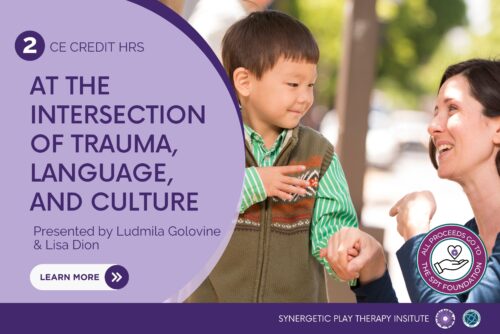 This dynamic, two-hour video course delves into the intricate interplay between trauma, neurocognitive processes, and communication patterns, shedding light on the challenges therapists face when working with survivors of trauma, especially those from culturally diverse backgrounds or with language barriers. Did you know that trauma's profound impact on neurocognitive functioning can significantly influence communication dynamics within therapeutic settings? This, coupled with cultural and linguistic disparities, can pose an added challenge when trying to establish rapport and foster healing with clients, particularly among Limited English Proficient or Deaf/Hard of Hearing individuals! Join Mila Golovine, President & CEO of Masterword. and Lisa Dion, Founder & President of the Synergetic Play Therapy Institute as they navigate the intersections of cultural competency, trauma-informed therapy, and effective communication strategies. You will also get insights into enhancing the therapeutic alliance, fostering better client engagement, and ultimately improving therapeutic outcomes! Key highlights include:
This dynamic, two-hour video course delves into the intricate interplay between trauma, neurocognitive processes, and communication patterns, shedding light on the challenges therapists face when working with survivors of trauma, especially those from culturally diverse backgrounds or with language barriers. Did you know that trauma's profound impact on neurocognitive functioning can significantly influence communication dynamics within therapeutic settings? This, coupled with cultural and linguistic disparities, can pose an added challenge when trying to establish rapport and foster healing with clients, particularly among Limited English Proficient or Deaf/Hard of Hearing individuals! Join Mila Golovine, President & CEO of Masterword. and Lisa Dion, Founder & President of the Synergetic Play Therapy Institute as they navigate the intersections of cultural competency, trauma-informed therapy, and effective communication strategies. You will also get insights into enhancing the therapeutic alliance, fostering better client engagement, and ultimately improving therapeutic outcomes! Key highlights include:- Understanding how trauma affects neurocognitive processes and communication patterns.
- Exploring cultural competence in therapy and its significance in trauma recovery.
- Identifying challenges and strategies for effective communication with clients from diverse backgrounds.
- Best practices for working with Limited English Proficient or Deaf/Hard of Hearing clients.
- Practical techniques to promote therapeutic alliance and engagement.
- Ethical considerations and sensitivity when utilizing interpreters in therapy sessions.

